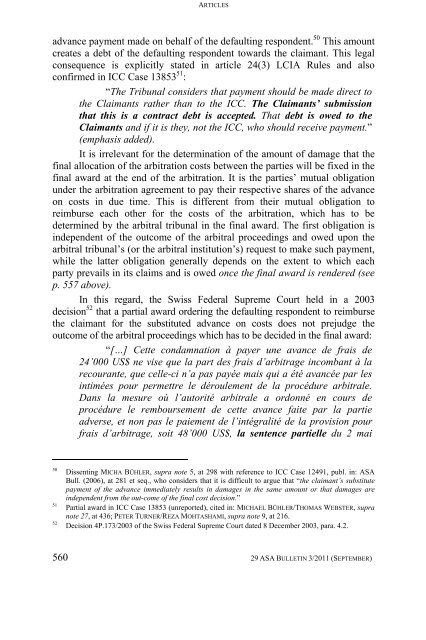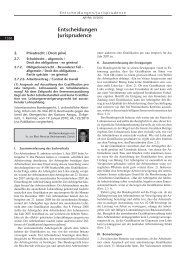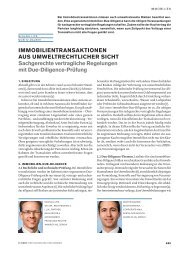ASAB 29-3 Thomas Rohner Michael Lazopoulos - Pestalozzi ...
ASAB 29-3 Thomas Rohner Michael Lazopoulos - Pestalozzi ...
ASAB 29-3 Thomas Rohner Michael Lazopoulos - Pestalozzi ...
Create successful ePaper yourself
Turn your PDF publications into a flip-book with our unique Google optimized e-Paper software.
ARTICLES<br />
advance payment made on behalf of the defaulting respondent. 50 This amount<br />
creates a debt of the defaulting respondent towards the claimant. This legal<br />
consequence is explicitly stated in article 24(3) LCIA Rules and also<br />
confirmed in ICC Case 13853 51 :<br />
“The Tribunal considers that payment should be made direct to<br />
the Claimants rather than to the ICC. The Claimants’ submission<br />
that this is a contract debt is accepted. That debt is owed to the<br />
Claimants and if it is they, not the ICC, who should receive payment.”<br />
(emphasis added).<br />
It is irrelevant for the determination of the amount of damage that the<br />
final allocation of the arbitration costs between the parties will be fixed in the<br />
final award at the end of the arbitration. It is the parties’ mutual obligation<br />
under the arbitration agreement to pay their respective shares of the advance<br />
on costs in due time. This is different from their mutual obligation to<br />
reimburse each other for the costs of the arbitration, which has to be<br />
determined by the arbitral tribunal in the final award. The first obligation is<br />
independent of the outcome of the arbitral proceedings and owed upon the<br />
arbitral tribunal’s (or the arbitral institution’s) request to make such payment,<br />
while the latter obligation generally depends on the extent to which each<br />
party prevails in its claims and is owed once the final award is rendered (see<br />
p. 557 above).<br />
In this regard, the Swiss Federal Supreme Court held in a 2003<br />
decision 52 that a partial award ordering the defaulting respondent to reimburse<br />
the claimant for the substituted advance on costs does not prejudge the<br />
outcome of the arbitral proceedings which has to be decided in the final award:<br />
“[…] Cette condamnation à payer une avance de frais de<br />
24’000 US$ ne vise que la part des frais d’arbitrage incombant à la<br />
recourante, que celle-ci n’a pas payée mais qui a été avancée par les<br />
intimées pour permettre le déroulement de la procédure arbitrale.<br />
Dans la mesure où l’autorité arbitrale a ordonné en cours de<br />
procédure le remboursement de cette avance faite par la partie<br />
adverse, et non pas le paiement de l’intégralité de la provision pour<br />
frais d’arbitrage, soit 48’000 US$, la sentence partielle du 2 mai<br />
50<br />
51<br />
52<br />
Dissenting MICHA BÜHLER, supra note 5, at <strong>29</strong>8 with reference to ICC Case 12491, publ. in: ASA<br />
Bull. (2006), at 281 et seq., who considers that it is difficult to argue that “the claimant’s substitute<br />
payment of the advance immediately results in damages in the same amount or that damages are<br />
independent from the out-come of the final cost decision.”<br />
Partial award in ICC Case 13853 (unreported), cited in: MICHAEL BÜHLER/THOMAS WEBSTER, supra<br />
note 27, at 436; PETER TURNER/REZA MOHTASHAMI, supra note 9, at 216.<br />
Decision 4P.173/2003 of the Swiss Federal Supreme Court dated 8 December 2003, para. 4.2.<br />
560 <strong>29</strong> ASA BULLETIN 3/2011 (SEPTEMBER)




